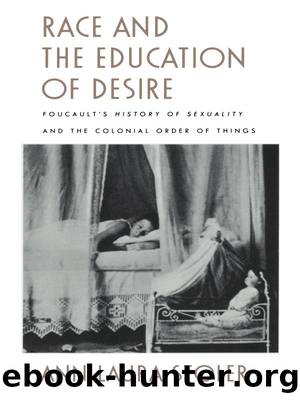Race and the Education of Desire by Ann Laura Stoler

Author:Ann Laura Stoler [Stoler, Ann Laura]
Language: eng
Format: epub
Publisher: Duke University Press
Published: 1995-10-04T07:00:00+00:00
Discourses of Race/Languages of Class
One might argue that racialized notions of the bourgeois self were idiosyncratic to the colonies and applicable there alone. But a repertoire of racial and imperial metaphors were deployed to clarify class distinctions in Europe at a very early date. While social historians generally have assumed that racial logics drew on the ready-made cultural disparagements honed to distinguish between middle-class virtues and the immorality of the poor, as well as between the âundeservingâ and the ârespectableâ poor among themselves, it may well be that such social etymologies make just as much sense reversed. The racial lexicon of empire and the sexualized images of it, in some cases, may have provided for a European language of class as often as the other way around. In a study of race and politics in Jamaica and Britain, Tom Holt cautiously notes that âthis language of class [may have] provided a vocabulary for thinking about race, or vice-versa. It hardly matters; what is important is the symmetry of the discourse. . . .â72 For my reading of Foucault, however, these racial etymologies of the language of class matter very much. They place the making of racial discourse, and a discourse on slavery in particular, as formative in the making of a middle-class identity rather than as a late nineteenth-century addition to it.
Certainly, Foucaultâs contention that the language of class grew out of the discourse of races would support such a claim. From Montaigne to Mayhew to Balzac, in Britain, the Netherlands, and France, imperial images of the colonized native American, African, and Asian as eroticized savage or barbarian saturated the discourses of class. In an intriguing analysis similar to Foucaultâs, Hayden White argues that the ârace fetishismâ surrounding the eighteenth-century notion of the ânoble savageâ was âsoon transformed . . . into another, and more virulent form: the fetishism of class.â73 But, unlike for Foucault, the template is not only an earlier racial discourse directed at internal enemies within Europe, but one prompted by imperial expansion. White writes:
Like the âwild menâ of the New World, the âdangerous classesâ of the Old World define the limitations of the general notion of âhumanityâ which informed and justified the Europeansâ spoliation of any human group standing in the way of their expansion, and their need to destroy that which they could not consume.74
Download
This site does not store any files on its server. We only index and link to content provided by other sites. Please contact the content providers to delete copyright contents if any and email us, we'll remove relevant links or contents immediately.
Kathy Andrews Collection by Kathy Andrews(10506)
The remains of the day by Kazuo Ishiguro(7542)
Spare by Prince Harry The Duke of Sussex(4188)
Paper Towns by Green John(4163)
The Body: A Guide for Occupants by Bill Bryson(3789)
Be in a Treehouse by Pete Nelson(3206)
Harry Potter and the Goblet Of Fire by J.K. Rowling(3025)
Goodbye Paradise(2949)
Never by Ken Follett(2872)
Into Thin Air by Jon Krakauer(2695)
The Remains of the Day by Kazuo Ishiguro(2614)
The Genius of Japanese Carpentry by Azby Brown(2602)
The Cellar by Natasha Preston(2592)
Drawing Shortcuts: Developing Quick Drawing Skills Using Today's Technology by Leggitt Jim(2528)
120 Days of Sodom by Marquis de Sade(2428)
Architecture 101 by Nicole Bridge(2348)
The Man Who Died Twice by Richard Osman(2289)
Machine Learning at Scale with H2O by Gregory Keys | David Whiting(2264)
Fairy Tale by Stephen King(2058)
